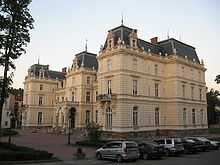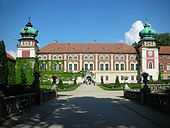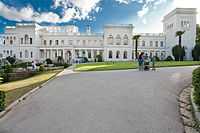House of Potocki



.PNG)


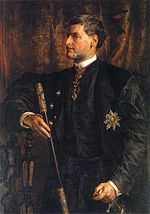

Potocki (Polish pronunciation: [pɔˈtɔt͡skʲi], plural Potoccy) was one of the notable Polish noble families in the Kingdom of Poland and magnates of the Polish-Lithuanian Commonwealth.
History
The Potocki family originated from Potok in the Kraków Voivodeship; their family name derives from that place name. The family contributed to the cultural development and history of Poland's Eastern Borderlands (today Western Ukraine). The family is renowned for numerous Polish statesmen, military leaders, and cultural activists.
The first known Potocki was Żyrosław z Potoka (born about 1136). The children of his son Aleksander (~1167) castelan of Sandomierz, were progenitors of new noble families such as the Moskorzewski's, Stanisławski's, Tworowski's, Borowski's and Stosłowski's. Jakub Potocki (~1481-1551) was the progenitor of the magnate line of the Potocki family, with descendants living today, including those living in America.[citation needed]
The magnate line split into three primary lineages, called:
- "Linia hetmańska" ("Srebrna Pilawa"), in English: "Hetman's lineage" ("Silver Pilawa"). Note some sources refer to Pilawa as Piława.
- "Linia Prymasowa" ("Złota Pilawa"), in English: "Primate's lineage" ("Golden Pilawa")
- "Żelazna Pilawa", considered the oldest ones, in English: "Iron Pilawa"
The "Złota Pilawa" line received the title of count from the Emperor of the Holy Roman Empire in 1606. The entire family began using the Count title after the partitions of Poland. The title was recognized 1777 and 1784 in the Kingdom of Galicia and Lodomeria and 1838, 1843, 1859, 1890 1903 in Russia and 1889 in the Papal States and in the Kingdom of Poland (Congress Poland).
In 1631 Stefan Potocki, who started the "Złota Pilawa" lineage, died and was buried in Złoty Potok (Golden Potok, a village owned by this lineage), his descendants started to use the Pilawa coat of arms in golden colour. Because of that the lineage is called the "Złota Pilawa" (Golden Piława).
There are also four branches called:
- "Gałąź łańcucka" (Branch of Łańcut)
- "Gałąź krzeszowicka" (Branch of Krzeszowice)
- "Gałąź tulczyńska" (Branch of Tulczyn)
- "Gałąź wilanowska" (branch of Wilanów)
Named after the hubs of their respective constellations of properties.
The family became prominent in the 16th and 17th centuries as a result of the patronage of Chancellor Jan Zamoyski and King Sigismund III Vasa.
Coat of arms and motto
The Potocki family used the "Pilawa" arms and their motto was: "Scutum opponebat scuto" (possibly "Shield opposing shield", neo-Latin?).
-

Silver Pilawa
-

Golden Pilawa
-

Coat of Arms of Counts Potocki
-

Pilawa at the Potocki mausoleum at Wilanow Park
-
Pilawa at the Lańcut Castle
-
Pilawa at Lezajsk monastery
Members
- Aleksander Stanisław Potocki (1778–1845), landowner, politician
- Alfred Józef Potocki (1817–1889), Sejm Marshal, Minister-President of Austria
- Alfred Wojciech Potocki (1785–1862), landowner, politician
- Andrzej Potocki (?-1692), Field Crown Hetman
- Andrzej Potocki (1618–1663), Obozny and voivode
- Teodor Potocki (1664–1738), Primate of Poland and interrex in 1733
- Antoni Protazy Potocki (1761–1801), banker and voivode
- Artur Potocki (1787–1832), landowner, officer
- Ewa Józefina Julia Potocka (1818-1895), married to Prince Franz de Paula of Liechtenstein
- Feliks Kazimierz Potocki (1630–1702), Field and Great Hetman of the Crown
- Franciszek Salezy Potocki (1700–1772), Krajczy, Field Clerk of the Crown
- Jan Potocki (1761–1815), writer (The Manuscript Found in Saragossa)
- Janusz Stanislaw Potocki (1940–2005), Physicist
- Jerzy Józef Potocki (1889–1961), diplomat, officer
- Józef Potocki (1673–1751), Great Hetman of the Crown
- Józef Potocki (?-1723), Great Guard of the Crown
- Katarzyna Potocka (?-1642), was married to Janusz Radziwiłł
- Konstancja Potocka (1781–1852), was married to Jan Potocki and Edward Raczyński
- Mikołaj Potocki (1595–1651), Field and Great Crown Hetman
- Mikołaj Bazyli Potocki (1712–1782), Starost of Kanev, benefactor of the Pochayiv Lavra
- Natalia Potocka (1810–1830), was married to Roman Sanguszko
- Roman Ignacy Potocki (1750–1809), co-author of the Polish Constitution of May 3, 1791
- Roman Potocki (1851–1889), landowner
- Stanisław Kostka Potocki (1755–1821), writer, publicist, collector and patron of art
- Stanisław "Rewera" Potocki (1579–1667), Field and Great Hetman of the Crown
- Stanisław Potocki (1659-1683), starost of Halicz and Kołomyja, rotmistrz and pułkownik of cavalry
- Stanisław Szczęsny Potocki (1753–1805), Marshal of the Targowica Confederation
- Wiktoria Elżbieta Potocka (?-c.1670), was married to Adam Hieronim Sieniawski and Andrzej Potocki
Legendary member
The family is also associated with the legend of Walenty Potocki (Abt. 1700-1749), also known by the Hebrew name of Abraham ben Abraham and as the Vilna Ger Tzedek or "Learned Convert of Vilna", who was counted as one of the most revered martyrs in Jewish history. According to the story he was a convert to Judaism, and reputed to be the son of the reigning Count Potocki. According to the story he was burned at the stake in 1749 by Roman Catholic authorities in Vilna (a London magazine of 1753 does contain the story that a Croatian Raphael, Abraham Isacowicz, was in fact burned in Vilna in 1753). No verifiable details exist of the martyr's life or of his actual identity, but numerous novels, plays, and poems in several languages have been written about him. Recent researches (Tazbir 2003) have concluded that no member of the eminent Potocki family could have died in this manner at this period without leaving substantial evidence.
Distinguished member
- Count Geoffrey Potocki de Montalk (1902–1997), accomplished New Zealand poet, has been erroneously described as a "feigned member" of the Pilawa Potocki family. In fact, he is a direct descendant of the Bocki Potocki line, until recently believed to have died out with the death of Count Jozef Franciszek Jan Potocki, his great grandfather, in Paris. Jozef's son, Count Joseph Wladislas Edmond Potocki de Montalk, born Paris 1836, B. es L. (Sorbonne), fought in Garibaldi's campaign of 1859, and arrived in New Zealand in 1868 where he became Professor of Modern Languages at Auckland University College. He was the author of The Elements of French Literature, 1879; founder and president of the Alliance Française; a member of the Société de Linguistique de Paris; and, as an Officier d'Académie, was a recipient of the Palmes académiques. Professor Potocki de Montalk had twelve children; the eldest son, Robert Wladislas, an Auckland architect, was Geoffrey Potocki de Montalk's father.
Potockis and vodka
The Potockis distilled spirits at their famous Łancut estate in the country's oldest distillery. The Potockis are better known for their contribution to Poland's military, political, and cultural history over six centuries, however, today their name is most recognized by their continued contribution to the distillation of vodka.
When the Łancut estate passed to the Potocki family in 1816, it contained one of Poland's oldest distillery that existed already in 1784. It was extensively developed by the Potockis during the 19th Century.
The Count Alfred Potocki's Privileged Distillery in Łańcut produced vodkas, spirits and liqueurs of such renown that it received Imperial privilege from the Habsburg Emperors and won several gold medals in international competitions. The Łańcut distillery continued to operate until 1944 when it was confiscated by the Communist regime. Since 1991 it is again an autonomous company - Polmos Łańcut.
Today, Potocki Wódka is produced in Western Poland under the present day owner, Jan-Roman Potocki.
Palaces
-
.jpg)
Palace in Vysokaye
-

Palace of Szczęsny Potocki in Tulczyn
-
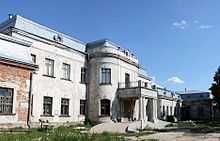
Palace in w Krystynopol
-
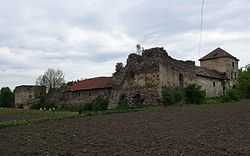
Ruins of a castle from the 17th century in Zolotyi Potik
-

Palace in Natolin
-

Potocki's Palace in Międzyrzec Podlaski
-

Castle in w Zator
-

Palace of Adam Józef Potocki in Krzeszowice
-

Palace Chrząstow (Koniecpol)
-
Palace "Pod Baranami" in Kraków
-
Zbarski Palace in Kraków
-

Ruins of a castle in Pomorzany (near Lwów)
-
.jpg)
Ruins of the castle in Buczacz
-

Palace in Nemyriv
-
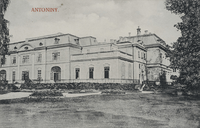
Palace in Antoniny (Khmelnytskyi Oblast)
-

The Potocki mausoleum at Wilanów Park at Warsaw
See also
- Potocki Palace
- Pochayiv Lavra
- Piława Coat of Arms
Further reading
- Potocka-Wąsowiczowa, Anna z Tyszkiewiczów. Wspomnienia naocznego świadka. Warszawa: Państwowy Instytut Wydawniczy, 1965.
References
External links
- Castle Museum in Łańcut
- Wikipedia Historia Łańcuta in Polish
- Family album from about 1860-1875(Public Domain)



